#Devops skillset
Explore tagged Tumblr posts
Text
What Jobs Go into DevOps: Key Roles in DevOps | OpsNexa!
Discover the many roles in DevOps and how they contribute to the success of modern software development and IT operations. This article delves into the roles that make DevOps work, What Jobs Go into DevOps, the skills needed for each function, and how professionals interact to deliver high-quality software efficiently. Learn about the various job prospects in DevOps, whether you're just getting started or looking to make a change.
#Devops job roles#Devops career path#Devops positions#Devops team structure#careers-in-devops#Devops engineer roles#Devops skillset#Devops career guide
0 notes
Text
Ad | Some Humble Bundle Delights
Only 16 hours left of Metroidvania Mania! This has some excellent Metroidvania games like Ghost Song and Axiom Verge 1&2! Money raised goes to the Global FoodBanking Network.
Brutal Beat 'Em Ups has something for those who enjoy classic fighting games - Like BattleToads! Money raised goes to Active Minds and Safe in Our World (Disclosure: I'm an Ambassador for Safe in Our World)
The Let 'Em Cook bundle has a banger of a lineup for cooking game fans. Cooking simulator, Cafe Owner Simulator, PlateUp! There's tons there. Money raised goes towards World Central Kitch and No Kid Hungry.
Jumping briefly into career progressions - Dive into DevOps bundle has books on Python, GoLang, Kubernetes and a whole bunch more. Great for people looking to expand their digital skillset and raising money for the Python Software Foundation.
Last but not least, Fully Loaded: Nightdive FPS Remasters has a great line up of classic FPS games. Turok, Rise of the Triad, Doom64 and Blood. If you've ever watched a Civvie video then you'll recognise a few from this list. Raising money for Active Minds.
91 notes
·
View notes
Text
Level Up Your Software Development Skills: Join Our Unique DevOps Course
Would you like to increase your knowledge of software development? Look no further! Our unique DevOps course is the perfect opportunity to upgrade your skillset and pave the way for accelerated career growth in the tech industry. In this article, we will explore the key components of our course, reasons why you should choose it, the remarkable placement opportunities it offers, and the numerous benefits you can expect to gain from joining us.
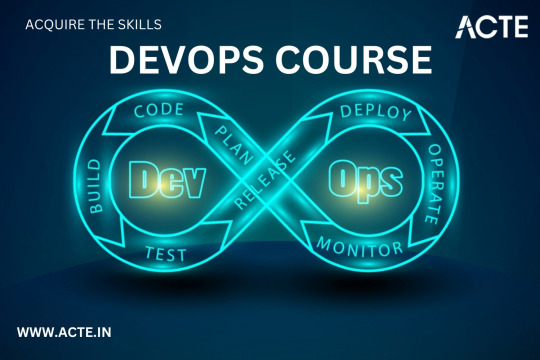
Key Components of Our DevOps Course
Our DevOps course is meticulously designed to provide you with a comprehensive understanding of the DevOps methodology and equip you with the necessary tools and techniques to excel in the field. Here are the key components you can expect to delve into during the course:
1. Understanding DevOps Fundamentals
Learn the core principles and concepts of DevOps, including continuous integration, continuous delivery, infrastructure automation, and collaboration techniques. Gain insights into how DevOps practices can enhance software development efficiency and communication within cross-functional teams.
2. Mastering Cloud Computing Technologies
Immerse yourself in cloud computing platforms like Amazon Web Services (AWS), Microsoft Azure, and Google Cloud Platform. Acquire hands-on experience in deploying applications, managing serverless architectures, and leveraging containerization technologies such as Docker and Kubernetes for scalable and efficient deployment.
3. Automating Infrastructure as Code
Discover the power of infrastructure automation through tools like Ansible, Terraform, and Puppet. Automate the provisioning, configuration, and management of infrastructure resources, enabling rapid scalability, agility, and error-free deployments.
4. Monitoring and Performance Optimization
Explore various monitoring and observability tools, including Elasticsearch, Grafana, and Prometheus, to ensure your applications are running smoothly and performing optimally. Learn how to diagnose and resolve performance bottlenecks, conduct efficient log analysis, and implement effective alerting mechanisms.
5. Embracing Continuous Integration and Delivery
Dive into the world of continuous integration and delivery (CI/CD) pipelines using popular tools like Jenkins, GitLab CI/CD, and CircleCI. Gain a deep understanding of how to automate build processes, run tests, and deploy applications seamlessly to achieve faster and more reliable software releases.
Reasons to Choose Our DevOps Course
There are numerous reasons why our DevOps course stands out from the rest. Here are some compelling factors that make it the ideal choice for aspiring software developers:
Expert Instructors: Learn from industry professionals who possess extensive experience in the field of DevOps and have a genuine passion for teaching. Benefit from their wealth of knowledge and practical insights gained from working on real-world projects.
Hands-On Approach: Our course emphasizes hands-on learning to ensure you develop the practical skills necessary to thrive in a DevOps environment. Through immersive lab sessions, you will have opportunities to apply the concepts learned and gain valuable experience working with industry-standard tools and technologies.
Tailored Curriculum: We understand that every learner is unique, so our curriculum is strategically designed to cater to individuals of varying proficiency levels. Whether you are a beginner or an experienced professional, our course will be tailored to suit your needs and help you achieve your desired goals.
Industry-Relevant Projects: Gain practical exposure to real-world scenarios by working on industry-relevant projects. Apply your newly acquired skills to solve complex problems and build innovative solutions that mirror the challenges faced by DevOps practitioners in the industry today.
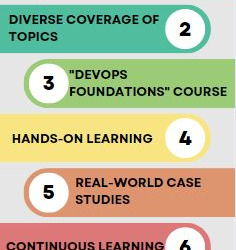
Benefits of Joining Our DevOps Course
By joining our DevOps course, you open up a world of benefits that will enhance your software development career. Here are some notable advantages you can expect to gain:
Enhanced Employability: Acquire sought-after skills that are in high demand in the software development industry. Stand out from the crowd and increase your employability prospects by showcasing your proficiency in DevOps methodologies and tools.
Higher Earning Potential: With the rise of DevOps practices, organizations are willing to offer competitive remuneration packages to skilled professionals. By mastering DevOps through our course, you can significantly increase your earning potential in the tech industry.
Streamlined Software Development Processes: Gain the ability to streamline software development workflows by effectively integrating development and operations. With DevOps expertise, you will be capable of accelerating software deployment, reducing errors, and improving the overall efficiency of the development lifecycle.
Continuous Learning and Growth: DevOps is a rapidly evolving field, and by joining our course, you become a part of a community committed to continuous learning and growth. Stay updated with the latest industry trends, technologies, and best practices to ensure your skills remain relevant in an ever-changing tech landscape.
In conclusion, our unique DevOps course at ACTE institute offers unparalleled opportunities for software developers to level up their skills and propel their careers forward. With a comprehensive curriculum, remarkable placement opportunities, and a host of benefits, joining our course is undoubtedly a wise investment in your future success. Don't miss out on this incredible chance to become a proficient DevOps practitioner and unlock new horizons in the world of software development. Enroll today and embark on an exciting journey towards professional growth and achievement!
10 notes
·
View notes
Text
Exploring the Depths of DevOps: Unraveling Collaboration and Efficiency in Software Development
In the dynamic landscape of modern software development, DevOps stands as a transformative catalyst, introducing a new era of collaboration, efficiency, and continuous improvement. This article aims to untangle the intricacies of DevOps, shedding light on its significance, emphasizing its advantages, and acknowledging potential challenges. The journey to embrace the capabilities of DevOps is made more accessible and impactful through dedicated DevOps Training in Pune.

Embracing a Unified Approach to DevOps
Defining DevOps: DevOps, a fusion of "Development" and "Operations," transcends being a mere set of practices – it embodies a cultural shift within organizations. At its core, DevOps seeks to bridge the historical divide between software development and IT operations, promoting a collaborative approach to the software development lifecycle through the integration of practices, tools, and cultural philosophies.
The Imperative Need for DevOps Today
In the fast-paced realm of technology, the indispensability of DevOps has never been more evident. Here are key reasons why DevOps has become a necessity:
1. Accelerated Delivery:
DevOps empowers organizations to release software at an accelerated pace, enabling quick responses to market demands and maintaining a competitive edge.
2. Enhanced Collaboration:
Breaking down silos between development and operations teams, DevOps fosters improved communication and collaboration, ensuring a unified and cohesive approach to software delivery.
3. Improved Efficiency:
Automation, a fundamental aspect of DevOps, streamlines processes such as testing, deployment, and infrastructure management, reducing manual errors and expediting time-to-market.
4. Continuous Feedback:
DevOps instills a culture of continuous feedback, allowing teams to iterate and enhance software rapidly, ensuring alignment with user expectations and business requirements.
5. Scalability and Flexibility:
DevOps practices enable organizations to scale infrastructure and applications effortlessly, adapting to changing demands and accommodating growth seamlessly.
6. Increased Reliability:
Through automation in testing and deployment processes, DevOps contributes to more reliable and stable software releases, minimizing downtime and disruptions.
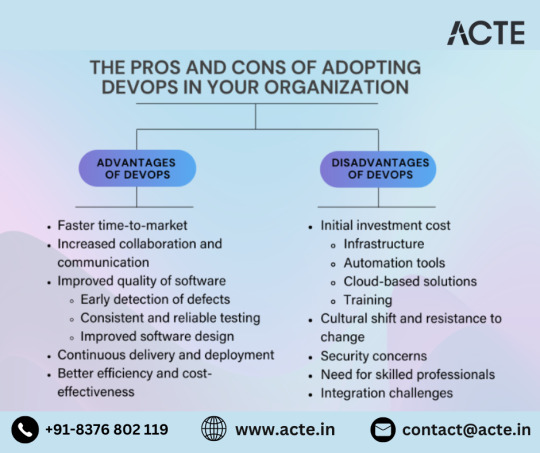
Advantages of Embracing DevOps
1. Faster Time-to-Market:
DevOps accelerates development and deployment cycles, reducing the time required to introduce new features and improvements to end-users.
2. Improved Collaboration:
Enhanced collaboration between development, operations, and stakeholders fosters a culture of shared responsibility and collective ownership.
3. Increased Efficiency:
Automation streamlines repetitive tasks, allowing teams to focus on high-value activities, contributing to increased overall efficiency.
4. Enhanced Quality:
Continuous testing and integration practices ensure early identification and addressing of defects, resulting in higher software quality.
5. Cost Savings:
Automation, efficiency improvements, and faster time-to-market contribute to cost savings over time, making DevOps a cost-effective approach.
Challenges in the DevOps Journey
1. Initial Implementation Complexity:
The adoption of DevOps may pose challenges during the initial phase, requiring changes to existing processes and cultural shifts within the organization.
2. Security Concerns:
Rapid development and deployment may raise security concerns, necessitating the thorough integration of security measures into the DevOps pipeline.
3. Skillset Challenges:
Teams may need additional training to adapt to new tools and practices, requiring a commitment to ongoing skill development.
In Conclusion: A Holistic Approach to DevOps Adoption
DevOps is not just a buzzword; it's a cultural shift that aligns with the demands of modern software development. The advantages often outweigh the challenges, making embracing DevOps an essential step for organizations aiming to thrive in today's dynamic and competitive business environment. It's a journey that demands commitment, adaptability, and a steadfast focus on continuous improvement.
2 notes
·
View notes
Text
some more questions you can ask (i work in tech but these should be broadly applicable to other types of office jobs):
what project have you been excited to work on recently?
what's interdepartmental communication like? are there often cross-team projects?
how are decisions about goals and roadmaps made? how much input does this team have on what we work on?
think of the most loadbearing coworker from your last job and figure out how to ask if there's someone at the company that fills a similar role (for me, this is asking about project management style and devops)
what would it look like for someone to be successful in this role?
what are the gaps in the team's cumulative skillset? / what do you feel like the team is missing? (then go on to explain how you can fill those gaps)
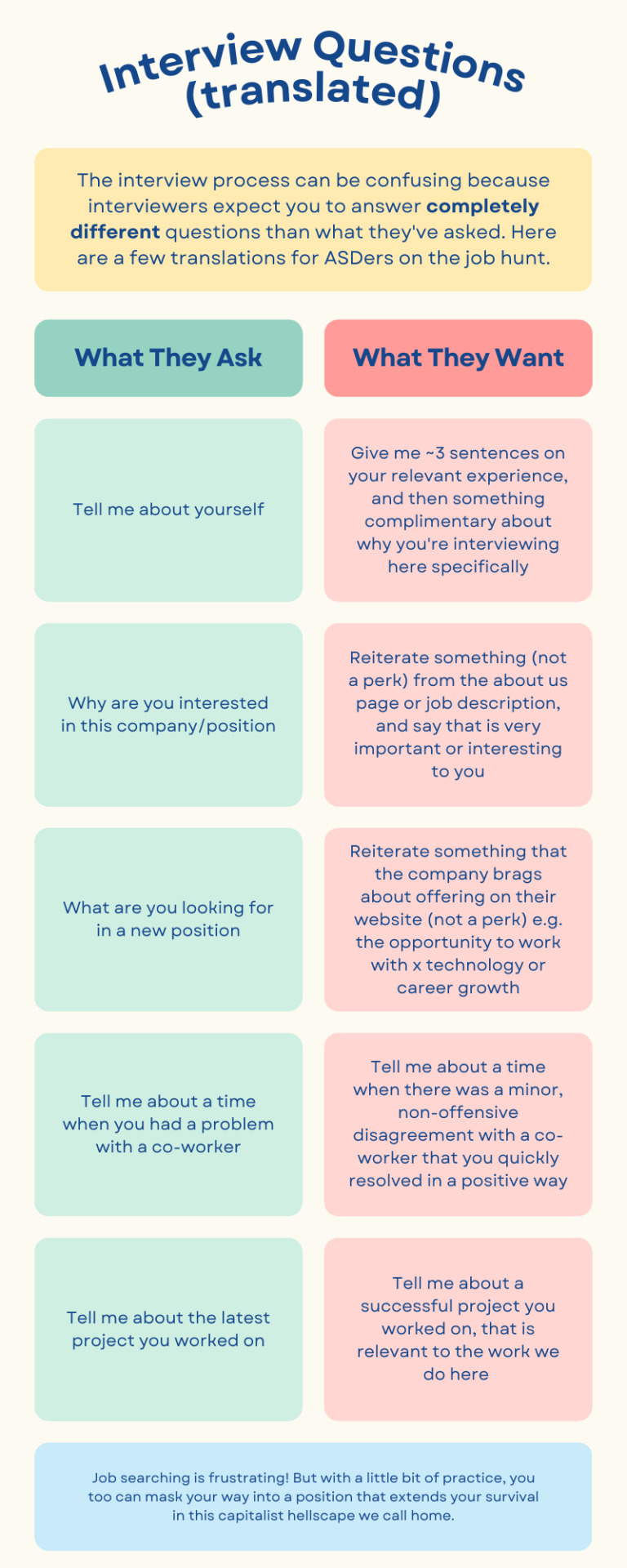
138K notes
·
View notes
Text
Mastering the Full Stack: Why .NET Developers Are in Demand in Jaipur
In today's digital-first world, the ability to build end-to-end web applications is more valuable than ever. And for developers in Jaipur, mastering the Full Stack .NET Developer path isn’t just a career move—it’s a leap toward becoming a highly sought-after engineering powerhouse.
🎯 What Does a Full Stack .NET Developer Do?
A Full Stack .NET Developer bridges the gap between front-end user experience and back-end logic. In a single role, you might:
Design sleek, responsive UI using HTML, CSS, and JavaScript frameworks
Architect server-side logic with C#, ASP.NET MVC/Web API, or .NET Core
Manage SQL Server databases with complex queries and stored procedures
Ensure apps run smoothly in the cloud—typically on Microsoft Azure
Deploy live applications using CI/CD pipelines
Why Samyak Infotech’s Training Program Stands Out
Samyak Infotech in Jaipur offers a Full Stack .NET Developer course featuring:
Live project training—build real-world applications as you learn samyak.com+8samyakinfotech.com+8samyak.com+8samyak.comin.linkedin.com+1samyakinfotech.com+1
Comprehensive coverage of ASP.NET MVC, Web API development, and SQL Server samyakinfotech.com
A Microsoft-authorized center: quality training backed by official credentials samyakinfotech.com
Over two decades of experience in technical education and custom software in.indeed.com+7samyak.com+7instagram.com+7
Course Highlights at a Glance
ComponentWhat You’ll LearnFront-endHTML, CSS, JavaScript, jQuery––basics of modern web UIBack-endASP.NET MVC, Web API, .NET Core, microservicesDatabaseMS SQL Server, stored procedures, Entity FrameworkToolsSource control, CI/CD platforms like Azure DevOpsCloudBasics of deploying apps on Microsoft AzureTestingDebugging, unit testing, performance profiling
Hands‑on labs ensure that knowledge moves from theory to professional-grade code.
Who Should Enroll?
Ideal candidates include:
Fresh graduates aiming to launch a web development career
Working developers expanding into .NET stack
Professionals seeking robust backend + frontend skillsets
Entrepreneurs building scalable web apps in-house
Career Roadmap: Where This Can Take You
Completing this course opens doors to roles like:
Full Stack Developer – A T‑shaped engineer fluent in both client and server-side logic
Web API Developer – Specialist in interfaces between applications
.NET Developer – Deep expertise in Microsoft technology ecosystems
Software Engineer on Azure – Focus on cloud-native .NET development
According to industry trends, .NET full‑stack positions offer competitive salaries and demand continues to grow, especially for candidates with hands-on, project-based experience.
The Takeaway
If you're in Jaipur (or beyond) and eager to master full‑stack development with a focus on .NET, Samyak Infotech offers a compelling blend:
Live, project‑based learning
End-to-end coverage of front‑end, back‑end, database, cloud, and DevOps
Credibility through Microsoft-authorized training
A gateway to thriving, high‑demand tech roles
By the end of this course, you won’t just know .NET—you’ll have built, launched, and managed full‑stack web applications ready for production. If you’re passionate about modern web development and ready to dive deep, this could be your path forward.
0 notes
Text
What Skills Do You Need to Become a Full Stack Developer?
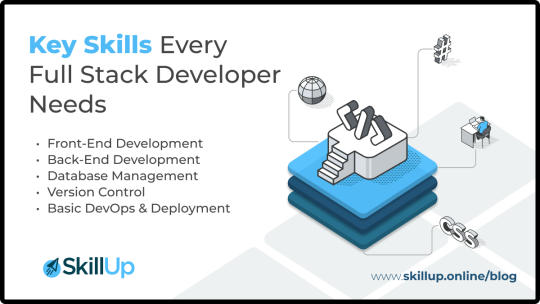
Full stack developer is officially the #2 most in-demand IT job of 2025—and for good reason. Companies are racing to build seamless, high-performing digital experiences, and they need versatile developers who can handle both front-end creativity and back-end power to bring their visions to life.
Therefore, mastering full stack development doesn’t just future-proof your career—it unlocks access to high-paying roles, with salaries reaching up to $159,570. Whether you’re designing sleek user experiences or optimizing complex databases, this skillset makes you an invaluable asset in today’s tech-driven world.
Now let’s explore how YOU can power your tech career and become a full stack expert…
Core Technical Skills Required to Become a Full Stack Developer
Mastering full stack development means being proficient in both front-end and back-end technologies, understanding databases, and having a solid grasp of version control and DevOps. Let’s break down each skill in detail.
1. Front-End Development Skills
The front-end, or client-side, is the part of the application users interact with directly. A full stack developer must ensure that the UI is engaging, responsive, and functional across all devices.
Essential Front-End Technologies:
HTML (HyperText Markup Language): The backbone of web structure, used to define content layout.
CSS (Cascading Style Sheets): Styles the HTML elements, making the UI visually appealing.
JavaScript (JS): The programming language that adds interactivity, animations, and dynamic elements.
Front-End Frameworks & Libraries:
To build modern, scalable applications, full stack developers rely on JavaScript frameworks like:
React.js – Developed by Facebook, used for building highly interactive UIs.
Angular.js – A powerful Google-backed framework for building large-scale applications.
Vue.js – A progressive framework known for its simplicity and flexibility.
Responsive Web Design:
With users accessing websites from various devices, applications must adapt seamlessly to different screen sizes. To ensure this, developers use:
Bootstrap – A CSS framework for building mobile-friendly layouts quickly.
Tailwind CSS – A utility-first CSS framework offering more flexibility and customization.
A good front-end experience keeps users engaged and enhances accessibility, directly impacting user retention and business growth.
2. Back-End Development Skills
The back-end, or server-side, manages business logic, databases, and server communication. This is where data is processed and stored. Key full stack skills include back-end programming languages, API development and integration, and authentication and security.
Popular Back-End Programming Languages:
Node.js (JavaScript-based) – Ideal for real-time applications like chat apps.
Python (Django/Flask) – Known for simplicity and scalability.
Ruby on Rails – Used for rapid application development.
Java (Spring Boot) – Great for enterprise-level applications.
PHP – A widely-used language for web development.
API Development & Integration:
Full stack developers must know how to build and consume APIs to connect the front-end with the back-end:
RESTful APIs – A standard for web communication using HTTP requests.
GraphQL – A more flexible alternative to REST, allowing clients to request specific data.
Authentication & Security:
To protect user data and ensure secure communication, developers must implement:
JWT (JSON Web Token): Used for secure authentication.
OAuth: An authorization framework allowing users to log in with Google, Facebook, etc.
Session Management: Maintaining user authentication states.
A strong back-end ensures scalability, security, and performance, allowing the application to handle real-world data and traffic efficiently.
3. Database Management
A full stack developer must know how to handle and manipulate databases to store, retrieve, and manage application data efficiently.
Types of Databases:
SQL Databases (Structured Data): Used when data consistency is critical.
Examples: MySQL, PostgreSQL, Microsoft SQL Server.
NoSQL Databases (Unstructured Data): Used for scalability and flexibility.
Examples: MongoDB, Firebase, Cassandra.
Key Database Concepts:
CRUD Operations – Create, Read, Update, and Delete data efficiently.
ORM (Object-Relational Mapping) – Tools like Sequelize (Node.js), Hibernate (Java), and SQLAlchemy (Python) help interact with databases.
Data Indexing & Optimization – Ensuring faster queries and minimal load times.
Efficient database management ensures that applications can store and retrieve data quickly, making them scalable and high-performing.
4. Version Control & DevOps Basics
Version control systems allow multiple developers to collaborate efficiently and track changes in code.
Version Control (Git & GitHub/GitLab)
Git – A distributed version control system.
GitHub/GitLab/Bitbucket – Platforms for hosting repositories and managing collaborative projects.
Version control prevents code conflicts and allows developers to roll back to previous versions if needed.
CI/CD Pipelines (Continuous Integration & Deployment)
Automating the software development lifecycle ensures faster and error-free deployments. Essential tools include:
Jenkins – Automates testing and deployment.
GitHub Actions – A built-in GitHub CI/CD tool.
Cloud Computing & Containerization
To build scalable applications, full stack developers must be familiar with cloud-based deployments and containerization technologies:
Docker – Creates lightweight containers for running applications.
Kubernetes – Orchestrates multiple containers for large-scale apps.
Cloud Providers: AWS, Google Cloud, Azure for hosting scalable applications.
Mastering these core technical skills transforms a developer into a well-rounded full stack engineer. From building responsive UIs to managing secure databases and deploying cloud-based applications, a full stack developer is a one-stop solution for end-to-end development.
Soft Skills for a Full Stack Developer
Problem-Solving & Debugging
A full stack developer will constantly encounter challenges, from fixing a buggy UI to optimizing database performance. Strong problem-solving skills help in:
Identifying issues efficiently and debugging code effectively.
Thinking analytically to break down complex problems into smaller, manageable tasks.
Learning from mistakes and improving code quality over time.
Tip: Practice problem-solving with coding challenges on platforms like LeetCode, HackerRank, and CodeWars to sharpen this skill.
Communication & Collaboration
Developers don’t work in isolation. They must communicate clearly with:
Designers to implement user-friendly interfaces.
Backend engineers to ensure seamless integration.
Stakeholders & clients to understand project requirements.
Being able to articulate ideas clearly, ask the right questions, and provide constructive feedback makes teamwork more productive.
Tip: Improve communication skills by actively participating in team meetings, code reviews, and open-source contributions.
Time Management & Adaptability
The tech industry evolves rapidly, and developers need to:
Prioritize tasks effectively to meet deadlines.
Adapt to new technologies quickly as trends change.
Balance multiple responsibilities, from coding to troubleshooting.
Successful full stack developers continuously learn and adapt, staying ahead of industry trends while managing workloads efficiently.
Tip: Use project management tools like Trello, Asana, or Notion to organize tasks and track progress effectively.
Soft skills complement technical expertise, making full stack developers more efficient, collaborative, and adaptable. Mastering these skills ensures better teamwork, faster problem-solving, and a more successful career in web development.
How to Learn Full Stack Development & Gain Hands-On Experience
Enroll in Structured Online Courses
Structured courses provide a comprehensive curriculum, guiding you through both front-end and back-end technologies. Here is one course offering full stack development program:
TechMaster Certificate Program in Full Stack Development
Engage in Practical Projects
Applying theoretical knowledge through real-world projects is crucial. Consider the following approaches:
Personal Projects: Develop your own applications to solve problems or bring your ideas to life. This could range from simple websites to complex web applications.
Open-Source Contributions: Participate in open-source projects to collaborate with other developers, gain feedback, and improve your coding practices.
Build a Professional Portfolio
Showcasing your skills to potential employers is essential. Here’s how to create an impressive portfolio:
GitHub Profile: Host your projects on GitHub to demonstrate your coding abilities and version control practices.
Personal Website: Create a website to display your projects, articulate your development process, and share your journey as a developer.
Continuous Learning and Networking
The tech industry is ever-evolving. Stay current and connected by:
Attending Workshops and Webinars: Engage in events to learn about the latest trends and tools in full stack development.
Joining Developer Communities: Participate in forums and groups to exchange knowledge, seek mentorship, and collaborate on projects.
By combining structured education with practical application and continuous engagement with the developer community, you’ll be well-equipped to excel as a full stack developer.
Kickstart Your Journey as a Full Stack Developer
By mastering front-end and back-end development, understanding databases, and gaining soft skills, you position yourself for a high-growth career in tech. The demand for full stack developers is only increasing, making this a great time to dive in.
If you would like to know more about how you can get the necessary hands-on experience and get started, contact our Learner Support Team at [email protected]. They will be more than happy to guide you on your next steps. Originally published at https://skillup.online/blog/what-skills-do-you-need-to-become-a-full-stack-developer/ on March 15, 2025.
1 note
·
View note
Text
Top Courses for Software Developer Career Growth in 2025

As technology continues to evolve, so do the skills and tools required to build software that’s secure, scalable, and user-friendly. Whether you’re starting your journey as a coder or looking to accelerate your career, choosing the right courses for software developer success is crucial.
From front-end frameworks to back-end systems, cloud platforms to DevOps practices—today’s software professionals are expected to be versatile and agile. So how do you stay ahead in such a dynamic field?
The answer lies in choosing from the best software development courses—the ones that offer real-world projects, career-focused guidance, and current industry tools.
Let’s explore your learning roadmap.
Why Upskilling Is Essential in Software Development
Software development isn’t a one-and-done skillset. Languages, frameworks, and best practices shift regularly. Without continuous learning, developers risk becoming outdated in a highly competitive space.
Modern employers aren’t just looking for programmers. They want problem-solvers who understand architecture, user experience, and security. That’s why investing in structured courses for software developer growth is a smart long-term career move.
Must-Have Skills for Software Developers in 2025
Before we look at specific courses, here’s a snapshot of the most in-demand developer skills:
JavaScript, Python, Java, TypeScript
React, Angular, Vue.js
Node.js, Django, Spring Boot
Cloud platforms (AWS, Azure, GCP)
SQL, NoSQL, MongoDB
Git, CI/CD, Docker, Kubernetes
API design, RESTful services
Security fundamentals and testing
Whether you’re a beginner or experienced, there’s always a next level—and the best software development courses will help you reach it.
Best Online Courses for Software Developers
Here’s a curated list of top-tier courses for software developer careers in India:
1. NIIT Digital – Full Stack Product Engineering Program
If you’re serious about becoming a full-stack developer with a job-ready skillset, NIIT Digital offers one of the best software development courses in India.
What makes it stand out:
Covers both front-end and back-end in depth
Includes Git, APIs, cloud deployment, and DevOps basics
Hands-on projects with career support (mock interviews, resume help)
Live, mentor-led sessions with interactive learning
Aligned with hiring demands in Indian IT and product firms
It’s designed to take learners from zero to job-ready in 6–9 months.
2. Coursera – Meta Front-End and Back-End Certificates
Taught by engineers from Meta (Facebook), these certificate courses are ideal for beginners. They cover the modern web development stack and offer hands-on learning through portfolio projects.
3. Udemy – The Complete Web Developer Bootcamp
Affordable, self-paced, and updated regularly—this course is a favorite among self-learners. It covers HTML, CSS, JavaScript, Node, and deployment basics, making it a solid entry point.
4. edX – Harvard’s CS50: Introduction to Computer Science
Perfect for those looking to build strong theoretical foundations. It’s rigorous, well-structured, and globally respected.
Which Course Format Should You Choose?
When selecting courses for software developer skill-building, consider your learning style and goals:
Live instructor-led: Best for those who need structure and mentorship (e.g., NIIT Digital)
Self-paced: Ideal if you're balancing a job or studies (e.g., Udemy, Coursera)
Project-based: Essential for portfolio-building and job-readiness
Career support: Look for resume reviews, interview prep, and placement assistance
How NIIT Digital Adds Value
For Indian learners looking for a job-aligned program with strong mentorship, NIIT Digital is a top choice. Their software development programs are:
Industry-recognised
Designed with a career-first approach
Include hands-on labs, GitHub portfolios, and capstone projects
Provide one-on-one mentor access and career guidance
Their full stack course is especially suited for learners who want to be job-ready in under a year—with the added benefit of flexibility and live support.
Career Paths After Completing Software Development Courses
Depending on your chosen specialization, here are some roles you can pursue:
Front-End Developer
Back-End Developer
Full Stack Engineer
Mobile App Developer
DevOps Engineer
Software Tester
Cloud Developer
Final Thoughts
Software development is one of the most resilient, fast-growing, and rewarding career paths today. But staying competitive means committing to ongoing learning and choosing the best software development courses that match your goals.
Whether you're starting from scratch or leveling up, platforms like NIIT Digital provide structured, immersive programs that can take you from a curious beginner to a confident developer—ready for the challenges of tomorrow.
So, take the leap. Start your journey with one of the best courses for software developer success, and build software—and a future—that matters.
0 notes
Text
Mastering REST API Testing: Automation with Rest Assured and Postman

If you’ve ever wondered how web and mobile apps exchange data behind the scenes, you're already halfway to understanding the power of REST APIs. They’re the invisible gears that keep modern software running smoothly. But how do developers and testers ensure these APIs are working as expected?
Enter REST API testing—an essential skill for any aspiring or experienced tester. And if you're serious about becoming an expert in this space, mastering tools like Rest Assured and Postman is your best first step.
Whether you're new to automation or already working in QA, this guide will help you understand why REST API testing is so crucial, and how you can automate it efficiently. We’ll also show you how to start your journey with the right learning resource.
What is REST API Testing?
Let’s break it down:
REST (Representational State Transfer) is a widely used architectural style for designing networked applications. APIs following this model—known as RESTful APIs—use standard HTTP methods like GET, POST, PUT, and DELETE.
Testing these APIs means ensuring that they’re functioning as intended—delivering the right data, working under different conditions, and responding appropriately to errors.
In simple terms: REST API testing helps developers and testers confirm that APIs are reliable, secure, and performing as expected—before they reach the hands of users.
Why Should You Automate REST API Testing?
Manual testing can only take you so far. Imagine having to manually test every API endpoint, every time you make a change in code—it’s slow, inefficient, and error-prone.
That’s where REST API automation testing comes in.
Automation ensures:
Faster testing cycles
Consistent and repeatable results
Easy integration into CI/CD pipelines
Early bug detection
Improved test coverage
And most importantly—it frees up your time, allowing you to focus on more complex testing challenges.
Two Tools You Need: Rest Assured and Postman
1. Postman – The API Explorer
Postman is a GUI-based tool that lets you send HTTP requests to APIs and inspect their responses. It’s incredibly user-friendly, making it a favorite among testers and developers for quick API validation.
You can use it to:
Create and run manual tests
Write automated test scripts using JavaScript
Set up collections for test suites
Generate and share API documentation
If you’re just starting, Postman is the perfect gateway into the world of REST API testing.
2. Rest Assured – The Automation Powerhouse
Rest Assured is a Java-based library that allows you to write powerful and flexible API tests using code. It integrates well with testing frameworks like TestNG and JUnit, and it’s perfect for embedding into your CI/CD pipelines.
Why Rest Assured stands out:
Supports BDD (Behavior-Driven Development)
Easily handles JSON and XML responses
Offers in-depth assertions for response validation
Can automate authentication flows, headers, parameters, etc.
When you pair Postman with Rest Assured, you’ve got a complete testing toolbox—manual + automated.
Who Should Learn REST API Testing?
You might be wondering: Is this right for me?
If you fall under any of these categories, the answer is yes:
Manual testers looking to transition into automation
Automation testers expanding their skillset
Developers who want to test their own APIs
QA professionals involved in Agile or DevOps teams
Beginners entering the testing field
The good news is: you don’t need to be a coding wizard to get started. With the right guidance and structured learning path, anyone can master this.
Learn REST API Testing (Automation) From Scratch – With the Right Course
Learning on your own can be overwhelming. You might find scattered YouTube videos, outdated blog posts, or complex documentation.
What you need is a step-by-step course that takes you from beginner to expert.
We highly recommend checking out this complete learning experience: 👉 Rest API Testing (Automation) : Rest Assured + PostMan
This course has everything:
Beginner-friendly intro to APIs and HTTP methods
Real-world Postman projects
In-depth Rest Assured automation scripting
Integration with TestNG, Maven, and reporting tools
Hands-on assignments and practical demos
Interview preparation and tips
It’s perfect for both beginners and professionals, and it’s designed to help you build a strong portfolio while preparing for real job interviews.
Key Topics Covered in the Course
Here’s a peek at what you’ll learn:
What is an API and how REST works
Understanding API endpoints, methods, headers, and responses
Postman interface: Collections, environments, and variables
Writing test scripts in Postman using JavaScript
Building REST API automation frameworks using Rest Assured
Validating JSON and XML responses
Working with OAuth2 and authentication mechanisms
Advanced concepts like request chaining and data-driven testing
CI/CD integration for API tests
By the end of the course, you’ll be confident in your ability to automate API testing workflows like a pro.
Real-World Benefits of API Automation Testing
Let’s talk outcomes. What do you really gain from mastering API testing?
✅ Better Job Prospects
Automation testers with API testing skills are highly in-demand across tech companies, especially those using Agile and DevOps.
✅ Efficient Testing Process
Manual testing can be slow and repetitive. API automation saves hours and reduces human error—making your testing more efficient.
✅ Stronger Test Coverage
You’ll be able to test deep application layers that aren’t always accessible via UI testing. This leads to more thorough test coverage.
✅ Seamless CI/CD Integration
Automated API tests are easy to plug into your CI/CD pipeline, ensuring faster releases and fewer bugs in production.
✅ Improved Confidence in Software Quality
By validating the core logic of your application through API testing, you ensure robust, scalable, and bug-free applications.
Career Opportunities After Learning REST API Automation
The demand for skilled API testers continues to grow as companies shift toward microservices and cloud-based architectures. Here are some roles where your new skills will shine:
QA Automation Engineer
Software Development Engineer in Test (SDET)
Test Automation Architect
API Test Consultant
DevOps QA Engineer
You’ll also be able to crack interviews with top companies by showcasing your practical experience and understanding of REST API testing tools and techniques.
Tips for Getting Started
Ready to take the plunge? Here are some quick tips:
Start with Postman – It’s simple, visual, and gives you a feel for how APIs work.
Gradually move to Rest Assured – Once you’re confident with Postman, start writing automation scripts.
Work on small real-world projects – Test open-source APIs or mock your own.
Take notes and track your progress – This helps you retain and revise better.
Enroll in a structured course like this one: 👉 Rest API Testing (Automation) : Rest Assured + PostMan It guides you step-by-step with hands-on projects and real-world context.
Final Thoughts
In today’s software world, REST API testing is not optional—it’s essential. Whether you're working on web, mobile, or cloud apps, you need to ensure your APIs are rock-solid.
By mastering tools like Postman and Rest Assured, you equip yourself with the skills that make you stand out in the job market, deliver better-quality software, and future-proof your career in testing.
You don’t have to figure it all out on your own. Take the smart route and learn with expert guidance. Start your journey today with this comprehensive and practical course: 👉 Rest API Testing (Automation) : Rest Assured + PostMan
Automation is the future—and your journey begins now. 🚀
0 notes
Text
Invisible Brilliance: The Quiet Power of Full Stack Development
In the ever-evolving world of technology, enrolling in the Best Java Certification Course in Pune is often the first step toward unlocking bigger opportunities—especially in the field of full stack development. While this domain may not always grab headlines, it forms the foundation of nearly every digital experience we rely on daily.
From the interfaces we interact with to the servers working behind the scenes, full stack development ensures seamless functionality, security, and performance. It’s a quiet power—an invisible brilliance—that is transforming industries globally.
Let’s explore why this skillset is becoming non-negotiable for developers and how mastering Java and full stack technologies is paving the way for future-ready careers.
What is Full Stack Development?
Full stack development is the ability to work on both the frontend (user interface) and backend (server-side logic and databases) of an application. It’s not just about knowing multiple languages—it’s about understanding how every component of a system works together.
A full stack developer acts as the bridge between visual design and functional infrastructure. Their knowledge spans the entire tech stack, allowing them to troubleshoot, build, and scale complete web applications from scratch.
Why Full Stack Developers Are in Demand
With lean teams and rapid project timelines becoming the norm, companies are turning to full stack developers who can handle multiple responsibilities efficiently. From startups to tech giants, organizations prefer professionals who can see the big picture and work across disciplines.
The value of full stack expertise lies in:
Flexibility: Work across design, development, and deployment stages.
Efficiency: Speed up project timelines by reducing dependencies.
Cost-effectiveness: One person managing multiple layers of the stack.
Stronger Collaboration: Communicate better with designers, QA teams, and DevOps.
The Role of Java in Full Stack Development
Though full stack development involves several languages and frameworks, Java continues to be a staple—especially for backend development. Its security, scalability, and cross-platform compatibility make it an essential tool for building robust server-side applications.
If you're aiming to build a serious career in tech, choosing the Best Java Certification Course in Pune gives you more than syntax knowledge. It trains you in building APIs, handling data securely, integrating databases, and deploying enterprise-level applications.
Pune: A Growing Hub for Full Stack Education
Over the past few years, Pune has emerged as a technology and education hub. It houses numerous training institutes offering high-quality programs tailored to modern industry needs.
If you're looking for the Best Full Stack Course in Pune, this city offers a range of options with hands-on experience, real-time projects, and placement support. Many of these programs integrate Java, React, Node.js, MongoDB, and DevOps tools, preparing students to step confidently into development roles.
What to Look for in a Full Stack Course
It’s easy to get overwhelmed by the number of options available. But not every course delivers the depth and quality required to become job-ready.
When choosing a full stack course, consider the following:
Updated Curriculum: Includes latest tools like React, Node.js, Express, and MongoDB.
Backend Strength: Strong emphasis on core technologies like Java and Spring Boot.
Real-world Projects: Work on live assignments to build confidence.
Placement Support: Resume building, mock interviews, and job referrals.
Expert Trainers: Learn from professionals who have industry experience.
Courses that integrate Java into full stack development give students a major advantage—combining the power of one of the most trusted backend languages with modern frontend frameworks.
Benefits of Java-Centric Full Stack Training
One of the biggest advantages of Java-based training is its versatility. Whether you're building a web application, mobile app backend, or enterprise software, Java remains highly relevant.
Benefits include:
Wide industry usage in banking, healthcare, and government projects
Rich ecosystem with Spring, Hibernate, and Maven
Strong community support and job availability
High-performance applications suitable for scaling
By beginning with the Best Java Certification Course in Pune, learners can then smoothly transition into full stack training that covers everything from frontend development to cloud deployment.
The Invisible Brilliance of Full Stack Development
The magic of full stack development is that it’s rarely noticed when it’s done right. Yet it’s responsible for the smooth functionality of platforms like Amazon, Netflix, and LinkedIn.
The invisible brilliance lies in seamlessly blending the user interface with secure and scalable backend systems. This is why top courses, including the Best Full Stack Course in Pune, are designed to build holistic problem-solvers—not just coders.
Conclusion: Build Beyond the Basics
Becoming a full stack developer is not just about learning multiple languages—it’s about building a mindset of adaptability, creativity, and system-wide thinking.
For anyone looking to future-proof their career in tech, starting with the Best Java Certification Course in Pune is a smart move. It forms the backbone of backend development, which, when combined with modern frontend and DevOps skills, creates a full stack powerhouse.
If you're serious about coding, application development, or launching your own digital product, enrolling in the Best Full Stack Course in Pune could be the most valuable investment you make.
Because in the end, the real brilliance doesn’t shout—it works quietly, powering the digital world behind the scenes.
0 notes
Text
Why You Should Earn a Certified AIOps Foundation Certification in 2025
In today’s fast-paced digital ecosystem, IT operations are evolving rapidly, and AIOps Certification is becoming a must-have credential for IT professionals. The GSDC AIOps Foundation Certification equips you with the knowledge to harness Artificial Intelligence for IT Operations, transforming how businesses manage their digital environments.
📘 What is the Certified AIOps Foundation Certification? The Certified AIOps Foundation Certification from GSDC provides a comprehensive understanding of AI-driven IT operations. It introduces you to machine learning, big data, and automation concepts that help in monitoring, managing, and enhancing IT services. Upon completion, you’ll earn a prestigious AIOps Certificate validating your expertise.
✅ Why Pursue AIOps Foundation Certification?
Gain a deep understanding of AIOps Foundation principles
Earn an industry-leading AIOps Foundation Certificate recognized globally
Learn to leverage AI and ML to enhance IT operations and service reliability
Stand out with a Certified AIOps Foundation credential
Drive operational efficiency and proactive issue resolution with AI-powered insights
🎓 Who Should Enroll? This program is ideal for IT professionals, DevOps engineers, system administrators, and operations managers aiming to modernize their skillset with Certified AIOps Foundation Certification knowledge.
Boost your career and stay ahead of IT trends with GSDC’s AIOps Foundation Certification your pathway to mastering AI-powered operations management.
🔗 Learn more here: https://www.gsdcouncil.org/aiops-foundation-certification
#AIOpsCertification #AIOpsFoundation #AIOpsFoundationCertification #CertifiedAIOpsFoundationCertification #AIOpsCertificate #AIOpsFoundationCertificate #CertifiedAIOpsFoundation #GSDCCertification
0 notes
Text
Unlock Your Future with DevOps AWS Courses in Hyderabad – IntelliQ IT
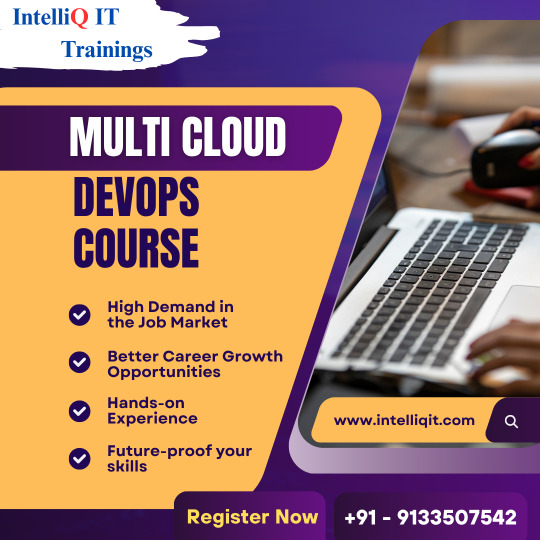
In today’s rapidly transforming IT industry, DevOps has emerged as a must-have skillset for professionals aiming to bridge the gap between development and operations. Hyderabad, being a top IT hub in India, is witnessing a growing demand for skilled DevOps professionals. If you're exploring top DevOps institutes in Hyderabad or looking to upskill with DevOps AWS courses in Hyderabad, you're on the right path to shaping a lucrative and future-proof career.
Why Choose DevOps?
DevOps is a culture and set of practices that bring development and operations teams together to shorten the development life cycle and deliver high-quality software continuously. By adopting DevOps, organizations improve productivity, enhance deployment frequency, and reduce the rate of failure for new releases.
Professionals skilled in DevOps tools like Docker, Kubernetes, Jenkins, Ansible, Terraform, and cloud platforms like AWS are in high demand across startups, MNCs, and tech giants.
The Rising Demand for DevOps and AWS Skills
With companies migrating their infrastructure to the cloud, AWS (Amazon Web Services) has become the leading cloud services provider. Integrating AWS with DevOps tools allows organizations to automate deployments, monitor systems, and scale applications effortlessly.
Learning DevOps with AWS is no longer a luxury—it’s a necessity. Hyderabad’s tech ecosystem demands certified professionals who can seamlessly integrate DevOps methodologies on AWS platforms.
DevOps Institutes in Hyderabad: What to Look For
When searching for DevOps institutes in Hyderabad, it’s essential to consider:
Comprehensive Curriculum: Ensure the course covers both foundational and advanced DevOps tools, cloud integration (especially AWS), CI/CD pipelines, and containerization technologies.
Hands-on Training: Practical exposure through real-time projects, labs, and case studies is critical for mastering DevOps.
Expert Trainers: Learn from certified trainers with industry experience in DevOps and AWS.
Placement Assistance: Institutes that offer resume building, mock interviews, and placement support can significantly boost your job prospects.
IntelliQ IT: A Trusted Name in DevOps AWS Training
Among the top DevOps institutes in Hyderabad, IntelliQ IT stands out for its dedication to delivering industry-relevant training. IntelliQ IT offers a well-structured DevOps AWS course in Hyderabad, designed for freshers, working professionals, and IT enthusiasts. The course not only covers key DevOps tools but also includes extensive AWS integration, ensuring you're job-ready from day one.
With a focus on real-time projects, practical labs, and expert mentorship, IntelliQ IT helps you build the confidence and skills required to crack interviews and succeed in the DevOps domain.
Key Features of IntelliQ IT's DevOps AWS Course:
In-depth coverage of AWS services like EC2, S3, IAM, CloudFormation, and more.
Practical training on CI/CD tools like Jenkins, Git, and Docker.
Live projects simulating real-world scenarios.
100% support in resume building and job placement.
Flexible batch timings including weekend and online classes.
Conclusion
If you are serious about your IT career, enrolling in DevOps AWS courses in Hyderabad is a smart investment. The synergy of DevOps and AWS is creating unmatched opportunities for tech professionals, and choosing the right institute is the first step toward success.
For quality-driven training with real-time exposure, IntelliQ IT is a name you can trust among the top DevOps institutes in Hyderabad. Take the leap today and power your career with cutting-edge skills in DevOps and AWS.
#devops training in ameerpet#devops training hyderabad#devops in ameerpet#devops course in hyderabad#aws institute in ameerpet
1 note
·
View note
Text
Master Linux Automation with RHCE (RH294): Red Hat Certified Engineer on RHEL 9 & Ansible 2.2
In the ever-evolving world of IT automation and DevOps, system administrators and developers are expected to manage large-scale environments with efficiency and precision. That’s where the Red Hat Certified Engineer (RHCE) certification steps in—equipping you with the skills to automate Linux tasks using Red Hat Ansible Automation Platform 2.2 on Red Hat Enterprise Linux 9 (RHEL 9).
🔧 What is RHCE?
The RHCE (EX294) certification is a professional-level credential offered by Red Hat, designed for experienced Linux administrators. It focuses on real-world automation using Ansible, one of the most powerful IT automation tools in the industry.
The course behind this certification, Red Hat System Administration III: Linux Automation with Ansible (RH294), is tailored to teach practical, hands-on skills in:
Ansible installation and configuration
Writing and managing playbooks
Automating Linux system administration tasks
Orchestrating deployments and configurations across multiple systems
Using Ansible roles for consistent configuration management
Integrating automation into daily administration
🚀 Why Learn RHCE on RHEL 9 with Ansible 2.2?
Red Hat Enterprise Linux 9 brings modern capabilities, improved performance, and enhanced security. Pairing that with Ansible Automation Platform 2.2, you gain access to powerful automation workflows, event-driven execution, and dynamic inventories—all necessary for managing enterprise-level infrastructure.
Here’s what makes RH294/RHCE a must-have:
✅ Based on the latest industry-standard platforms ✅ In-demand skillset across DevOps and SysAdmin roles ✅ Prepares you for real-world enterprise scenarios ✅ Hands-on labs to master automation workflows ✅ Career advancement with globally recognized certification
👨💻 Who Should Attend?
Linux System Administrators
Infrastructure Engineers
DevOps Professionals
Cloud and Automation Engineers
Anyone aiming to upgrade from RHCSA to RHCE
📘 Course Highlights (RH294)
Introduction to Ansible and YAML syntax
Managing inventories and host variables
Ansible playbooks and ad hoc commands
Creating roles and automating complex tasks
Configuring systems at scale
Troubleshooting and debugging Ansible scripts
🎯 Certification Exam: EX294
The RHCE exam tests your ability to use Ansible for system configuration and management. It’s a performance-based exam, meaning you’ll work on real systems to demonstrate your skills—not just answer multiple-choice questions.
🏁 Final Word
Whether you're aiming to become a Red Hat Certified Architect (RHCA) or simply want to advance your career with in-demand automation skills, RHCE (RH294) is your next step. With the combined power of RHEL 9 and Ansible 2.2, you're not just learning a tool—you're mastering a strategy to streamline IT operations.
Get Started Today with RHCE Training at HawkStack Technologies 👉 Corporate & Individual Training | Real-World Labs | Exam Prep | Career Guidance
📩 Contact us now to unlock your path to Red Hat certification success.
For more details www.hawkstack.com
0 notes
Text
Driving Tech Innovation with Scalable Workforce Solutions
In the fast-evolving world of technology and digital services, where disruption is the norm and talent drives transformation, workforce solutions are no longer just about staffing — they’re a strategic imperative. Whether you're a SaaS company, IT consulting firm, digital product startup, or enterprise undergoing digital transformation, the right workforce strategy can help you stay agile, competitive, and innovation-ready.
The Industry Dilemma: Skills Are Evolving Faster Than Hiring
Tech companies are constantly racing against rapid shifts in tools, platforms, and customer expectations. Roles like data scientists, cybersecurity analysts, cloud engineers, and AI specialists weren’t on the radar a decade ago — today, they’re business-critical. But the talent pipeline often lags behind. Internal hiring teams struggle to match this speed while ensuring quality, compliance, and cultural fit.
Workforce Solutions: A Strategic Edge
Workforce solutions go beyond recruitment. They provide a scalable, compliant, and future-proof way to access top-tier talent, manage global teams, and keep pace with innovation. Here’s how:
Access to Specialized Talent Pools Workforce partners tap into vast global networks of tech professionals, including niche roles and emerging skillsets. Whether you need blockchain developers or DevOps engineers, you get access to talent your internal teams might not reach.
Agility in Scaling Teams Launching a new product? Expanding into new markets? Need to augment your development team quickly? Workforce solutions make it seamless to scale up or down based on project needs without long-term overheads.
Compliance Without Complexity Managing a distributed tech workforce comes with regulatory hurdles. Employer of Record (EOR) services and global hiring platforms help you onboard talent in multiple countries while handling local laws, taxes, and benefits — without setting up legal entities.
Reduced Time-to-Hire Speed is everything in tech. Workforce solution providers reduce hiring timelines drastically through pre-vetted talent pools, automated matching tools, and industry-specific screening processes.
Strategic Workforce Planning From contract staffing to permanent hires, from onsite to offshore teams — workforce experts help you build the right mix of talent, optimized for cost, skill, and business priorities.
Empowering Innovation Through People
Technology is built by people. The companies that succeed are the ones that don’t just adopt new technologies — they attract and retain the people who can imagine, build, and scale them. Workforce solutions are not just a hiring tactic — they are an enabler of long-term innovation, digital transformation, and global business growth.
In a sector that moves at the speed of ideas, your workforce strategy can be the difference between staying ahead — or falling behind.
0 notes
Text
1. Introduction: Why DevOps Training in Marathahalli Bangalore is a Game-Changer
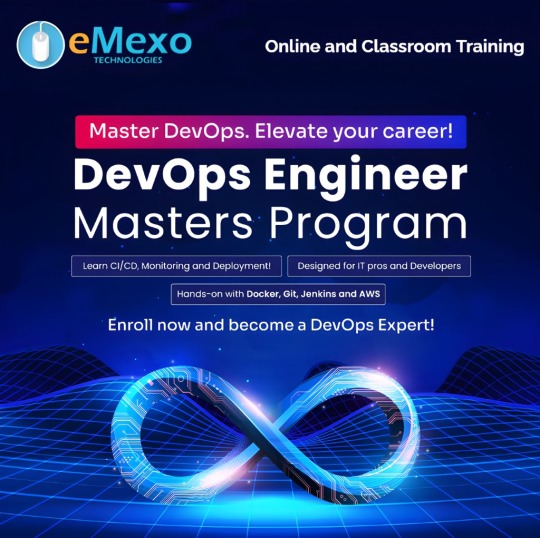
As the tech world rapidly moves toward automation and faster software delivery, DevOps has become a must-have skill across IT roles. At eMexo Technologies, we’ve designed a job-focused DevOps Training in Marathahalli Bangalore that helps you master tools and practices used by top tech companies. Whether you're just starting out or switching careers, our course gives you real-world experience that matters. If you're searching for the Best DevOps Training in Marathahalli Bangalore, you're in the right place.
2. About eMexo Technologies: Your Reliable Partner for DevOps Training in Marathahalli, Bangalore

We’re not just another training center—we’re your career partner. At eMexo Technologies, our goal is to give you more than just theory. As a leading DevOps Training Institute in Marathahalli Bangalore, we offer practical learning with the guidance of mentors who’ve worked on real DevOps projects. Our course blends technical depth with soft skills, ensuring you’re ready to thrive in interviews and the workplace. Learning at our DevOps Training Center in Marathahalli Bangalore means getting the right mix of hands-on practice, one-on-one support, and placement assistance.
3. What Makes Our DevOps Course in Marathahalli Bangalore Stand Out?
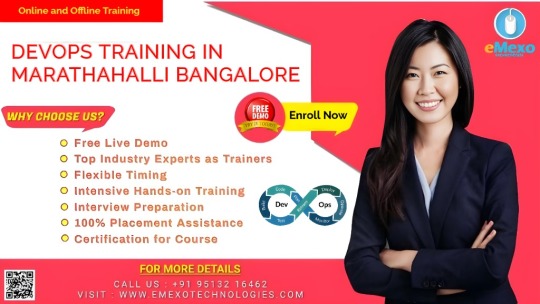
Our DevOps Course in Marathahalli Bangalore is built around what employers actually look for:
✅ Trainers with Real Experience: Learn directly from professionals who’ve worked in the DevOps trenches.
✅ Project-Driven Learning: Build pipelines, deploy applications, and automate tasks—just like in the real world.
✅ Tool Mastery: Get comfortable with Docker, Jenkins, Kubernetes, Git, and more.
✅ Personal Support: Stuck on something? Get personalized feedback and guidance whenever you need it.
✅ Career Support: Our DevOps Training and Placement in Marathahalli Bangalore program gives you the tools to succeed—resume help, mock interviews, and job referrals.
✅ We don’t just train you—we get you ready to work.
4. Build Your DevOps Career with Confidence in Marathahalli
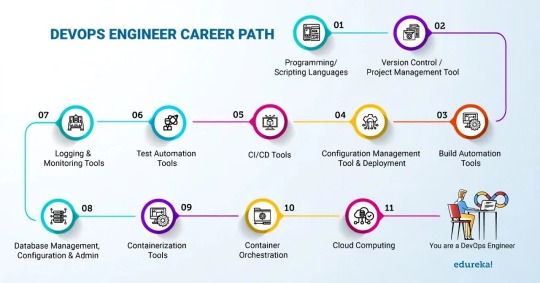
This course goes beyond just watching — it’s all about getting hands-on and truly learning by doing. Our DevOps Certification Course in Marathahalli Bangalore is interactive, hands-on, and focused on results. Here’s what students love about it:
✅ Learn at your own pace with guided mentorship
✅ Work on real deployment and automation projects
✅ Be a part of our growing alumni network in top IT companies
✅ Get full job support through our DevOps Training and Placement in Marathahalli Bangalore services
✅ Learn in a modern, collaborative classroom at our DevOps Training Center in Marathahalli Bangalore
And if you're someone already exploring technologies like Full Stack Developer Training in Electronic City Bangalore, DevOps adds the perfect skillset to make you stand out.
5. Real Students, Real Results: DevOps Training Testimonials
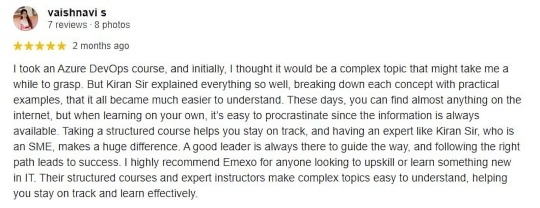
Don’t just take our word for it—our students say it best. After completing our DevOps Course in Marathahalli Bangalore, many have landed jobs in top companies, including roles in automation, CI/CD engineering, and cloud deployment.
What they say:
“The hands-on labs gave me real confidence.”
“Placement support helped me crack interviews easily.”
"Everything I learned was immediately useful in my day-to-day work—it felt like the training was made for my role."
We're honored to be part of so many student success journeys—and we're here to help you start your own.
6. Explore Exciting Career Opportunities After Completing DevOps Training in Marathahalli, Bangalore
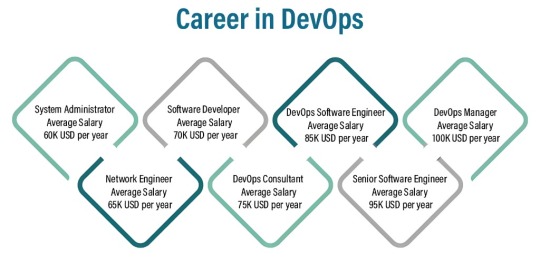
Once you complete the DevOps Certification Course in Marathahalli Bangalore, a range of job roles open up for you. Our graduates now work as:
✅ DevOps Engineers
✅ Site Reliability Engineers
✅ Cloud DevOps Specialists
✅ Automation Engineers
✅ CI/CD Pipeline Developers
Thanks to our strong DevOps Training and Placement in Marathahalli Bangalore, students get more than just skills—they get interviews, confidence, and career direction.
7. Ready to Launch Your DevOps Career? Start Your Journey Today!

If you're ready to upgrade your career, there’s no better place than eMexo Technologies. Our DevOps Training in Marathahalli Bangalore combines expert instruction, hands-on practice, and personalized career support. It’s more than a course—it’s a launchpad.
Join our DevOps Course in Marathahalli Bangalore, learn from the best, and transform your future. Whether you’re just starting or leveling up from DevOps Training Institute in Marathahalli Bangalore, our training gives you the tools to grow.
youtube
#DevOps#DevOpsTraining#DevOpsCourse#LearnDevOps#DevOpsEngineer#DevOpsSkills DevOpsCulture#Git#Jenkins#Docker#Kubernetes#Ansible#Terraform#Prometheus#Grafana#CI/CD#Automation#ITTraining#CloudComputing#SoftwareDevelopment#CareerGrowth#DevOpsTrainingcenterinBangalore#DevOpsTrainingInMarathahalliBangalore#DevOpsCourseInMarathahalliBangalore#DevOpsTrainingInstitutesInMarathahalliBangalore#DevOpsClassesInMarathahalliBangalore#BestDevOpsTrainingInMarathahalliBangalore#DevOpsTrainingandPlacementinMarathahalliBangalore#DevOpsTrainingInstitutesInElectronicCityBangalore#DevOpsClassesInElectronicCityBangalore#Youtube
0 notes
Text
How to Become a Certified Selenium WebDriver Tester with GSDC in 2025
Introduction
If you’ve been flirting with the idea of stepping into test automation, there’s never been a better time than 2025. The industry is booming, and being a certified Selenium testing professional can seriously boost your career game. Whether you're already in QA or looking to make a transition, this article will walk you through how to get certified with GSDC and why it matters.
🚀 Why Selenium? And Why GSDC?
Selenium is one of the most in-demand skills in test automation today. Employers are looking for candidates who don’t just know the tool—but own it. That's where becoming a certified Selenium testing professional with GSDC comes in. GSDC’s program is designed to give you hands-on, practical knowledge—something hiring managers love to see on a resume.
Plus, this selenium certification course is structured to suit both beginners and those already working in QA. No fluff—just real, applicable knowledge you can use at work right away.
📘 What’s Inside the Certification?
So, what do you actually get when you enroll in the GSDC selenium certification?
You’ll learn everything from Selenium WebDriver basics to framework building, grid execution, and integrating Selenium with DevOps pipelines. In short, this selenium testing certification covers everything a serious automation tester needs.
Once you complete the course, you’ll be ready to take the selenium certification exam—a globally recognized assessment that proves you’re not just a learner, but a doer. 🙌
💰 What About the Cost?
The selenium certification cost is refreshingly reasonable. GSDC frequently runs discounts, making the value for money pretty hard to beat. For under $100, you’re investing in a skillset that could open doors to job roles paying 2–3x more than your current one.
Getting that selenium certificate doesn’t just help you pass a test—it sends a message to employers that you’re serious about your career growth.
🧭 How to Get Started?
Visit the official GSDC website.
Choose the selenium certification course option.
Complete the modules and prep for the selenium certification exam.
Earn your selenium certificate and start applying your skills in the real world.
The whole process is self-paced, so you can do it alongside a full-time job or other commitments. Flexible learning, real outcomes. 👌
🎯 The Career Boost You’ve Been Waiting For
Adding a certified Selenium testing professional title to your LinkedIn or resume can be a total game-changer. You’ll stand out in job applications, qualify for more senior roles, and command higher pay—all because you took the time to level up with a solid selenium certification.
The tech world rewards those who invest in their skills. This is your moment.
📌 Final Thoughts
If you’ve been looking for a sign to upgrade your QA career, this is it. Becoming a certified Selenium testing professional through GSDC is more than just earning a selenium certificate—it’s a launchpad for bigger roles, better salaries, and deeper job satisfaction.
Don’t just watch others climb the ladder. Grab your gear—your selenium certification course—and start climbing. 🚀
For More Information: - https://www.gsdcouncil.org/certified-selenium-testing-professional
Contact:- +41 41444851189
0 notes